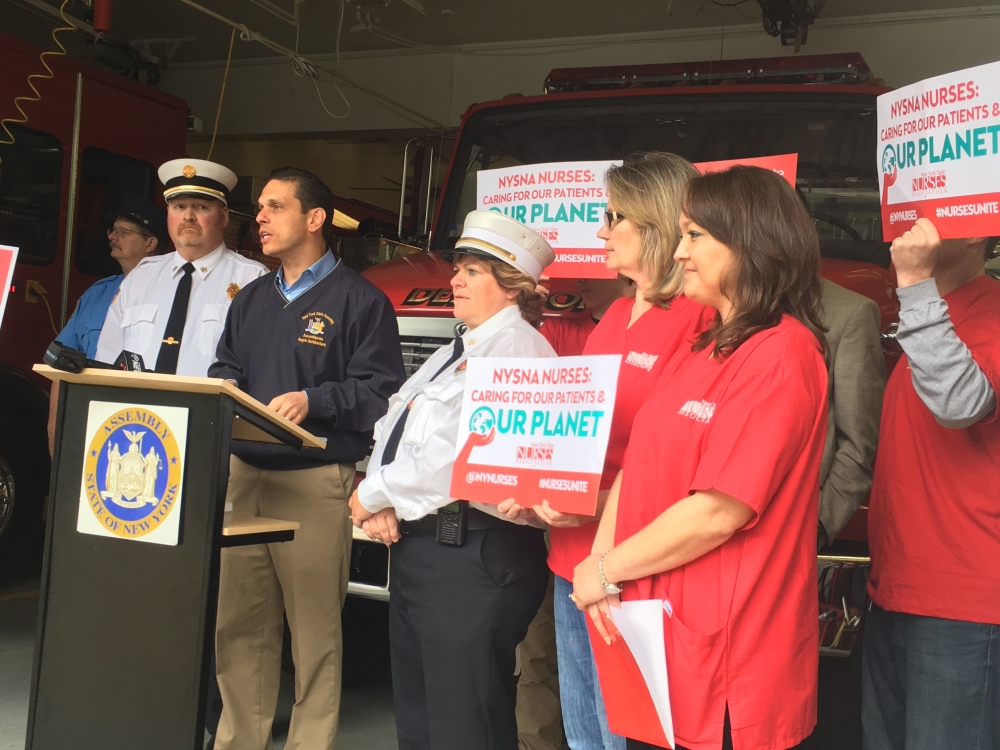Assemblyman Santabarbara Calls for Funding, Safety Measures for Rural Communities Where Oil Trains Pose Threat
New York nurses, Delanson volunteer firefighters highlight dangers to public safety, health
Assemblyman Angelo Santabarbara joined first responders and nurses Saturday at the Delanson Volunteer Fire Department to call for resources, training and legislation that would help protect rural communities against the growing threat of increased oil transportation by rail.
Santabarbara stood with Delanson Fire Chief Kevin Morrison and New York State Nurses Associations member Carol Ann Lemon, RN-BC, near the train tracks that carry oil trains alongside the fire department in appealing for more funding for trailers equipped with a firefighting foam that can be deployed to combat fires and spills in rural areas like Delanson.
The response trailers are equipped with Class B foam, which has the chemical makeup necessary to address accidents involving crude oil. When mixed with water, Class B foam forms a blanket over ignitable liquids, suppressing blazes and preventing them from spreading or reigniting.
Last year, 19 such foam trailers were committed to be deployed to fire departments in larger cities across the state, with the Division of Homeland Security and Emergency Services also providing training to fire departments and hazardous materials teams on how to operate the equipment, conduct training programs and coordinate response exercises.
“Transport of crude oil by rail has increased dramatically in recent years, putting our communities at a higher risk of accidents that could have devastating effects,” Santabarbara said. “In Delanson, these trains run alongside the fire department and right through the center of the village, and an accident could put the entire community in jeopardy. Fire departments in larger cities across the state have been given the resources and training to be prepared for these accidents, but volunteer fire departments in rural areas like Delanson are in desperate need of this assistance as their resources are already limited. Now is the time to prepare our volunteer firefighters and communities for the worst case scenario.”
Santabarbara also urged the state Legislature to pass legislation that would allow fire departments to respond to oil train accidents more efficiently and also regulate how crude oil is treated. One of the bills (A.7986) would help communities prepare for accidents involving oil trains by requiring companies making major shipments of crude oil to report the details of the route to first responders and public safety officials. The other proposal (A.6859) seeks to regulate crude oil as a toxic waste product, meaning it would have to be treated with the same stringent rules as other toxic waste under the Department of Environmental Conservation. Crude oil is currently exempt from these regulations, despite the fact that it poses a danger to public health and the environment if not treated properly.
“Our fire department is only 125 feet away from the tracks where crude oil is being shipped at considerable speeds, and if there was ever an accident it would be devastating for the entire village,” said Delanson Fire Chief Kevin Morrison, also noting that the Normanskill Creek starts in Delanson. “This funding would give us the materials and training required to protect our village residents and our own firefighters from these dangerous oil trains. Thank you to Assemblyman Santabarbara for advocating on behalf of the department and the safety of our residents and for fighting for legislation that would give our volunteer firefighters more time to prepare for a potential explosion or spill.”
New York State Nurses Association member and RN Carol Ann Lemon said, "New York can become the nation's leader in rail safety. That's why NYSNA is supportive of Assemblyman Santabarbara's efforts to secure funding for emergency services departments so that they could be more prepared to battle an oil train explosion. As nurses and caregivers, we are concerned with the significant and unacceptable risks to the health and safety of our community that is caused by these oil trains. Given the devastation that a disaster can cause to rural communities, we must do everything we can to prepare and protect emergency services personnel in their response."
The transport of crude oil by real has increased exponentially nationwide in recent years, from 9,000 carloads in 2008 to over 400,000 in 2013, and spills and explosions have become more frequent as a result.

